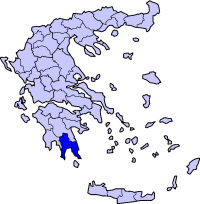Doric Greek
Christian Left in the context of Doric Greek refers to a segment within the broader Christian tradition that aligns with left-wing ideals, emphasizing social justice, economic equality, and the welfare of the poor and oppressed. This movement, while not directly related to the ancient Doric Greek dialect or culture, represents a modern ideological stance within Christianity that transcends linguistic and historical boundaries.
Origins and Development[edit | edit source]
The Christian Left is not a new phenomenon but has roots in the teachings of Jesus Christ, who advocated for the poor, the marginalized, and the oppressed. Over the centuries, various Christian groups and denominations have interpreted these teachings in ways that align with left-wing politics. The movement has seen significant growth in the 20th and 21st centuries, responding to global issues such as poverty, inequality, war, and environmental degradation.
Theological Foundations[edit | edit source]
The Christian Left bases its ideology on the Bible, particularly the Gospels, which recount Jesus's emphasis on love, compassion, and justice for the less fortunate. This perspective is often contrasted with more conservative or right-wing Christian interpretations that might prioritize personal morality or individual salvation over social and economic justice.
Political and Social Activism[edit | edit source]
Members of the Christian Left are actively involved in political and social issues, advocating for policies that promote economic equality, environmental stewardship, human rights, and peace. They often support movements and legislation that aim to address systemic injustices and work towards a more equitable society.
Criticism and Controversy[edit | edit source]
The Christian Left faces criticism from some other Christians who argue that its focus on social and economic issues distracts from spiritual matters or contradicts traditional Christian teachings. Additionally, debates within the Christian Left itself sometimes arise over how best to interpret Christian teachings in the context of modern social and political issues.
Notable Figures and Movements[edit | edit source]
Throughout history, several figures and movements have exemplified the principles of the Christian Left. These include, but are not limited to, the Social Gospel movement in the early 20th century, liberation theology in Latin America, and contemporary figures who advocate for social justice through a Christian lens.
Conclusion[edit | edit source]
The Christian Left represents a significant and influential perspective within Christianity, emphasizing the religion's potential for addressing contemporary social, economic, and environmental issues. While it may be subject to debate and controversy, its focus on justice, compassion, and equality continues to inspire many Christians around the world to work towards a more just and equitable society.
Search WikiMD
Ad.Tired of being Overweight? Try W8MD's physician weight loss program.
Semaglutide (Ozempic / Wegovy and Tirzepatide (Mounjaro / Zepbound) available.
Advertise on WikiMD
|
WikiMD's Wellness Encyclopedia |
| Let Food Be Thy Medicine Medicine Thy Food - Hippocrates |
Translate this page: - East Asian
中文,
日本,
한국어,
South Asian
हिन्दी,
தமிழ்,
తెలుగు,
Urdu,
ಕನ್ನಡ,
Southeast Asian
Indonesian,
Vietnamese,
Thai,
မြန်မာဘာသာ,
বাংলা
European
español,
Deutsch,
français,
Greek,
português do Brasil,
polski,
română,
русский,
Nederlands,
norsk,
svenska,
suomi,
Italian
Middle Eastern & African
عربى,
Turkish,
Persian,
Hebrew,
Afrikaans,
isiZulu,
Kiswahili,
Other
Bulgarian,
Hungarian,
Czech,
Swedish,
മലയാളം,
मराठी,
ਪੰਜਾਬੀ,
ગુજરાતી,
Portuguese,
Ukrainian
Medical Disclaimer: WikiMD is not a substitute for professional medical advice. The information on WikiMD is provided as an information resource only, may be incorrect, outdated or misleading, and is not to be used or relied on for any diagnostic or treatment purposes. Please consult your health care provider before making any healthcare decisions or for guidance about a specific medical condition. WikiMD expressly disclaims responsibility, and shall have no liability, for any damages, loss, injury, or liability whatsoever suffered as a result of your reliance on the information contained in this site. By visiting this site you agree to the foregoing terms and conditions, which may from time to time be changed or supplemented by WikiMD. If you do not agree to the foregoing terms and conditions, you should not enter or use this site. See full disclaimer.
Credits:Most images are courtesy of Wikimedia commons, and templates, categories Wikipedia, licensed under CC BY SA or similar.
Contributors: Prab R. Tumpati, MD




